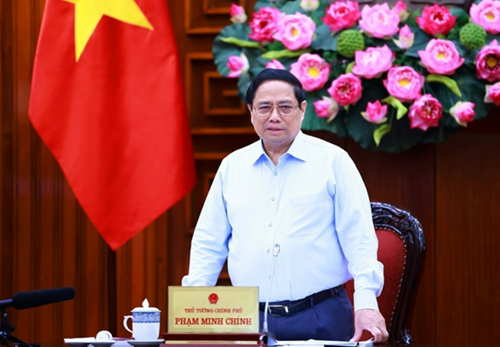He made the request while chairing a meeting between permanent Government members and ministries, sectors to discuss investment in the North - South high-speed railway project and the implementation of railway projects connecting with China.
    |
 |
|
Prime Minister Pham Minh Chinh speaks at the meeting on Saturday. |
The Ministry of Transport (MoT), together with other ministries and sectors, has studied high-speed railway models of many countries basing on which they proposed the North - South route of Vietnam should be 1,541km long, have a designated speed of 350km per hour, and comprise 23 passenger stations and five cargo ones. It should run through 20 provinces and cities, starting at Ngoc Hoi station in Hanoi and end at Thu Thiem station in Ho Chi Minh City. The total investment is estimated at 67.34 billion USD.
The MoT suggested that after the National Assembly (N.A.) approves the investment, bidding should be carried out to select an international advisory body while a survey to compile a pre-feasibility study report implemented in 2025-2026. Site clearance, contractor selection, and work on the sub-projects of the Hanoi - Vinh and Nha Trang - Ho Chi Minh City sections will be launched in late 2027. Meanwhile, the sub-projects of the Vinh - Nha Trang section will start in 2028 - 2029. The entire route is expected to be completed in 2035.
PM Chinh, who is also head of the State steering committee for key transport projects, stressed that the North - South high-speed railway project and the railway projects connecting with China hold critical importance to national development.
At the recent 10th session, the 13th Party Central Committee agreed in principle on investing in the North - South high-speed railway project, he noted, demanding ministries and sectors apply themselves to drafting this project to submit it to the Party Central Committee and the National Assembly for consideration, and propose the preparation of resources and other necessary conditions for implementation.
He said this railway will be amphibious, serving both socio-economic development and national defense-security. It must avoid large residential areas, be as straight and cost-saving as possible, and implemented in the fastest possible manner so as to be put into use soon to serve national development.
Besides, the route must be in conformity with the national and sectoral master plans, link with other means of transport like aviation and sea transport while connecting with domestic economic corridors and regional countries such as China, Laos, and Cambodia, he went on.
The Government leader also asked for reviewing total investment to ensure precision and considering specific and special mechanisms for this project, especially in terms of resource mobilization, procedures, and policies on land, site clearance, and building materials in order to ensure that procedures are streamlined and construction duration shortened.
He pointed out the need to promoting cooperation with international partners to make use of financial sources, receive technologies transferred, train human resources, and improve governance capacity to guarantee the safest and most scientific and effective operations of the route.
At the meeting, PM Chinh also ordered the railway projects connecting Vietnam with China be accelerated, namely Lao Cai - Hanoi - Hai Phong, Hanoi - Lang Son, and Mong Cai - Ha Long - Hai Phong.
The Lao Cai - Hanoi - Hai Phong route is about 380km long and has an estimated investment of 11.6 billion USD. Passenger and cargo trains will run at 160km per hour.
About 156km long, the Hanoi - Lang Son route will be invested with about 6 billion USD in total. Both passenger and cargo trains on this route will also run at 160km per hour.
Meanwhile, the Mong Cai - Ha Long - Hai Phong is about 187km long and invested with 7 billion USD. Passenger and cargo trains will operate at 160km per hour and 120km per hour, respectively.
All these three railways will use a track gauge of 1,435mm.
Source: VNA